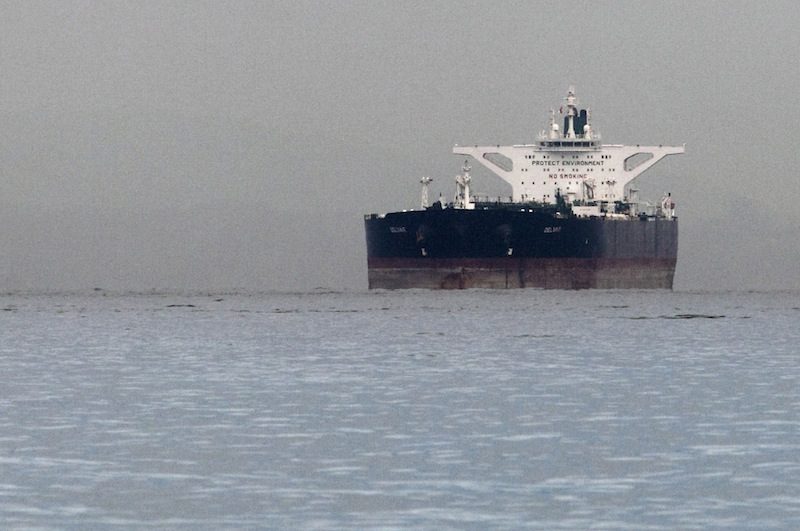 By Daniel Fineren
By Daniel Fineren
DUBAI, Nov 24 (Reuters) – Iran’s nuclear deal with the West is not intended to let more of its oil into the market, the White House said, but an easing of the ban on European shipping insurance may help smooth crude exports to its big Asian customers.
Iran and six world powers reached a deal early on Sunday to curb Tehran’s nuclear programme in exchange for limited sanctions relief.
U.S. and European Union sanctions that prevent energy companies from investing in Iran, and have slashed Tehran’s oil exports from 2.5 million barrels per day (bpd) to around 1 million bpd, remain in place.
“In the next six months, Iran’s crude oil sales cannot increase,” a fact sheet posted by the White House on the U.S. State Department’s website on Sunday said.
“Under this first step, the EU crude oil ban will remain in effect and Iran will be held to approximately 1 million bpd in sales, resulting in continuing lost sales worth an additional $4 billion per month, every month, going forward.”
In addition to having to reduce their purchases to win waivers from U.S. sanctions, Iran’s big oil customers in Asia have been put off importing even permitted volumes because of difficulties getting insurance for shipments.
India’s imports from Iran also dived in the first nine months of this year as refiners cut purchases because European reinsurers added a clause that could mean claims arising during the processing of Iranian oil would not be met.
The U.S. government fact sheet says that financial sector sanctions, including many types of insurance, remain intact.
But a senior western official said on Sunday that some relief on EU sanctions on oil shipping insurance was included in the deal.
Kevin Book, Managing Director at ClearView Energy Partners in Washington, said the apparent easing on insurance could provide for an increase of 200,000 to 400,000 bpd in Iranian exports, particularly to Indian refiners.
He also noted that the White House’s mention of a 1 million bpd limit was much higher than a recent estimate that Iran exported some 715,000 bpd in October, suggesting that the deal could mean a 285,000 bpd supply boost “relatively quickly.”
‘LIMITED, TARGETED’ RELIEF
The agreement also suspends sanctions by the United States and the EU on several other sectors of Iran’s economy in the initial six-month period. The relief, which the U.S. State Department said is “limited, temporary, targeted and reversible,” would potentially allow Iran to collect about $1.5 billion from resumption of trading gold and precious metal and resuming some trade for its auto and petrochemical exports sectors.
About $4.2 billion of oil sale revenue can be transferred in installments from accounts frozen in the West if Iran fulfills its commitment, bringing the total relief allowed in the package to about $7 billion, according to the State Department.
“The vast majority of Iran’s approximately $100 billion in foreign exchange holdings are inaccessible or restricted by sanctions,” the State Department said in a release on its website.
The U.S. ban on selling gold to Iran was meant to undermine the Iranian currency and put it under pressure to reach agreement on restricting its nuclear energy capabilities. But Turkey began selling gold to Iran in return for gasoline exports, according to Turkish data published in March.
The pact also allows specified foreign banks to release Iranian oil revenue that has been frozen in the country’s U.S. accounts to pay for food, medicine, medical devices and other “humanitarian” trade traffic for domestic use in Iran.
According to a full text of the deal released by the U.S. government and Iran’s state Fars news agency, the West will allow current purchasers of the country’s oil to continue buying their average amounts of crude.
AUTO, AIR TRADE
Sanctions also are lifted on Iran’s auto industry, while the pact also temporarily permits spare airplane parts to be sent to ensure flight safety for Iranian civil aviation.
Spokesmen for General Motors Co and Chrysler Group LLC declined to immediately comment. Ford Motor Co spokesman Laurence Frost said the company will “monitor the situation carefully as it may evolve over the next months” while following all legal requirements expected under the current sanctions.
The U.S. government imposed sanctions on auto exports to Iran after the 1979 revolution. But a small number of popular Detroit models, including the Ford Mustang, the Chevrolet Camaro and the Dodge Charger, are imported and sold in Iran by third-party distributors.
QUESTION ON POLICING SALES
It is unclear why the U.S. fact sheet does not mention plans to relax insurance controls, or how any such relief would be policed to prevent a sharp rebound in Iranian oil exports.
But removing insurance headaches for at least some shipments should help smooth a trade that has dipped below sanctioned levels this year.
“The relief in EU sanctions on oil shipping insurance is a big deal and creates the conditions to make it easier for Iran to get at least up to the sanctioned levels,” Olivier Jakob from the Petromatrix consultancy said.
Western pressure on Iran’s customers to find other suppliers has supported global oil prices over the last two years. Rising U.S. and Saudi production has helped dampen the impact of so much Iranian oil being sidelined.
U.S. lawmakers had been planning to make deeper cuts to Tehran’s crude exports, but Washington has put any further nuclear-related sanctions on hold, so long as Iran sticks to its side of the deal.
Less crude from Iran would increase pressure on regional rival Saudi Arabia to squeeze more out of oilfields that have already been pumping at record levels this year.
Benchmark Brent crude hit a six-week high of $111.40 on Friday on early uncertainty over whether an agreement over Iran’s nuclear programme would be reached.
Oil markets were closed on Sunday but the breakthrough is likely to weigh on prices when the market opens on Monday.
“The various groups aligned against any deal give the market good cause for skepticism, but this deal is clearly a significant and bearish development,” said Seth Kleinman, head of energy research at Citigroup.
The White House estimates that Iran has lost more than $80 billion since the beginning of 2012 because of lost oil sales. It also estimates Tehran’s earnings over the next six months will be $30 billion down compared with a six-month period of 2011, before sanctions were imposed.
Graphic on Iran’s oil exports to Asia: http://link.reuters.com/vyw45t
U.S. fact sheet on deal with Iran: http://www.state.gov/p/nea/rls/218021.htm
(Additional reporting by Simon Falush in London, Justyna Pawlak in Geneva, Paul Lienert in Detroit and Jed Horowitz in New York; Editing by William Hardy and Grant McCool)

 Join The Club
Join The Club











